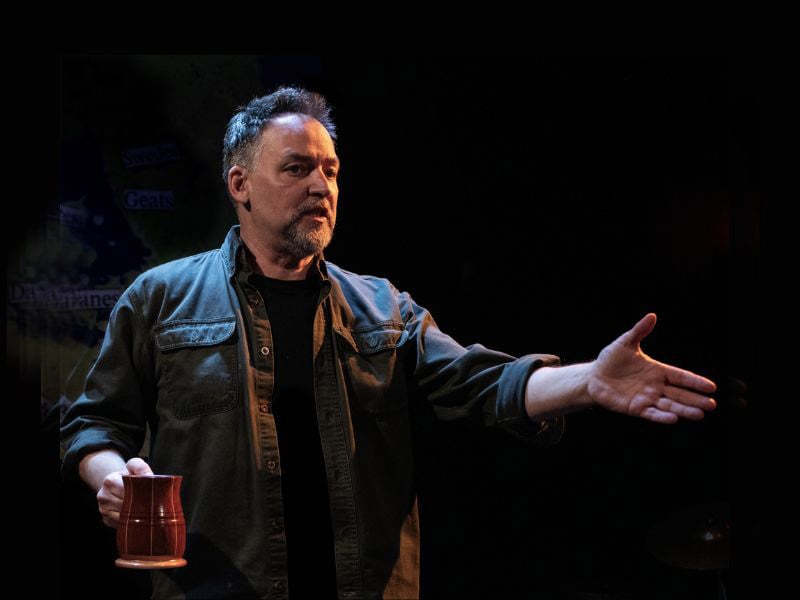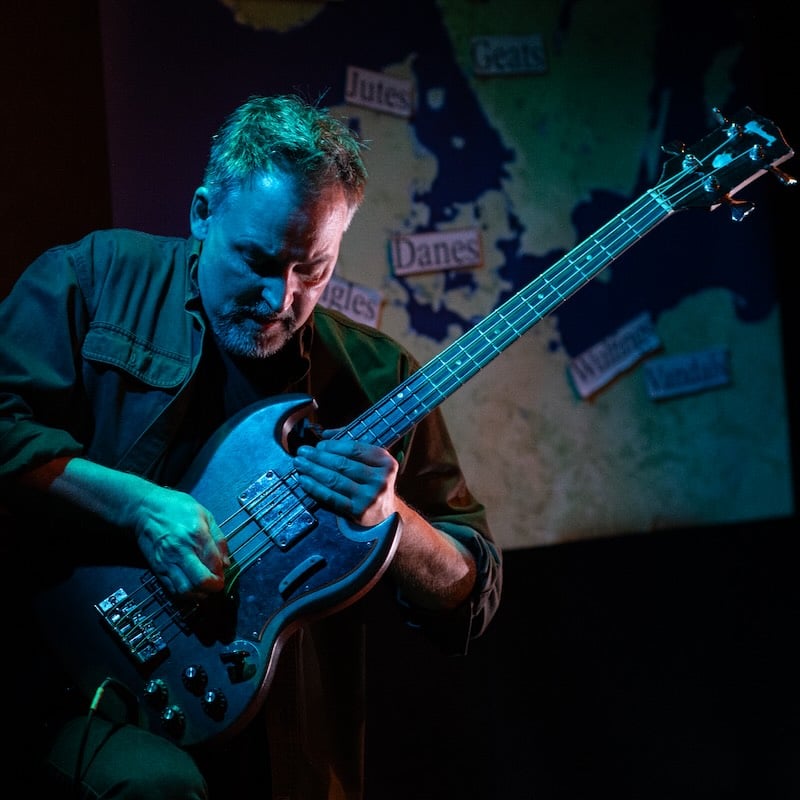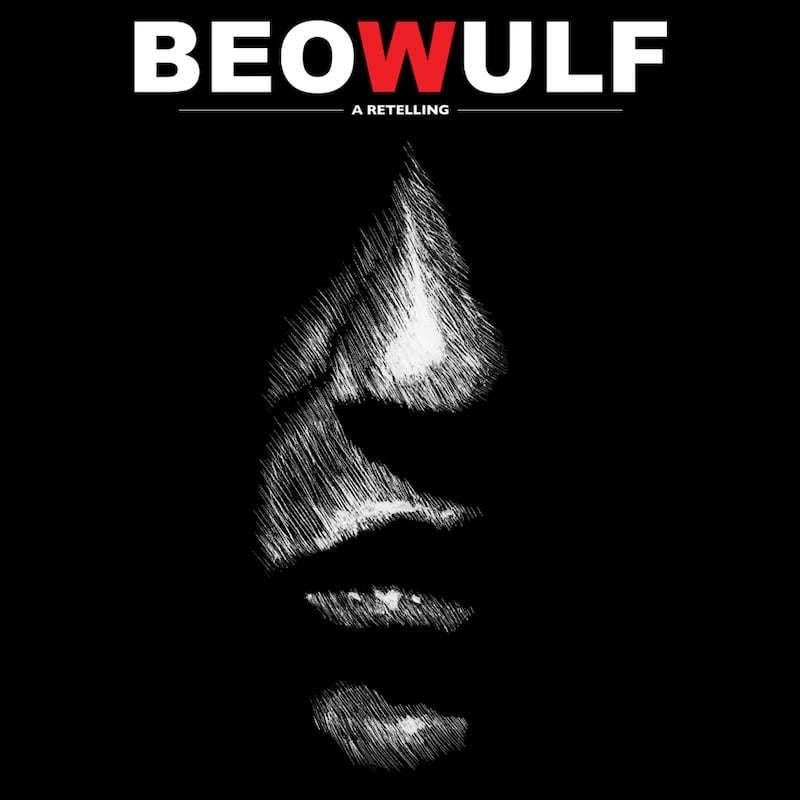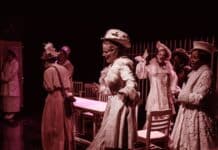Some of us are old enough to remember reading portions of Beowulf in high school English. Hrothgar, Unferth, Wiglaf, Hygelac, Halfdane … shadowy names from what feels (and felt) like a very distant past. But in a deeply engaging, deeply thoughtful one-man show at the Capitol Hill Arts Workshop (Beowulf, A Retelling), Taffety Punk Artistic Director Marcus Kyd turns those high school recollections on their head, suggesting that Beowulf and his tale have a great deal to say to us today about the true nature of heroism, what strength really means, and the power of art to convey timeless human values. In Kyd’s retelling, Beowulf is as relevant and inspiring today, in our own dark time, as it presumably was 1,500 years ago in what our English textbooks used to call (with no little presumption) “The Dark Ages.”
To place Beowulf’s story in a more analogous modern context — and, honestly, to make for a really fun night out — Kyd and his compatriots at Taffety Punk have turned the black box space at Capitol Hill Arts Workshop (their regular home) into a dive bar. It’s the modern equivalent of Beowulf’s mead hall, replete with a range of alcoholic and non-alcoholic drinks, including real mead. Taffety adds a welcome touch in free, refillable bowls of popcorn for every table, undoubtedly a better deal than the sheep’s innards Beowulf and his friends might be snacking on.

As our resident “scop” (Anglo-Saxon for oral poet), Kyd offers his own contextualization of Beowulf — generally considered the first great work of English literature — by inserting a handful of brief contemporary stories and folk tales that illuminate themes and values Beowulf espouses. These center on the true nature of heroism and include the story of Hawaiian surfer and lifeguard Eddie Aikau, said to have rescued over 500 people before himself being lost at sea; the Oversteegen sisters, Dutch teenagers who fought the Nazis during World War II; and the African American folk legend John Henry, who stood up for common laborers when he entered a steel-driving contest against a steam drill. (Kyd, with guitar, presents part of the famous ballad, in which John Henry beats the new-fangled machine but dies from his exertions.) Alongside these stories of heroes, Kyd adds the cautionary tale of Nicolae Ceaușescu, the brutal Romanian dictator whose lavish lifestyle belied the economic privations of his people and who (with his wife) was overthrown and executed in 1989.
“There are monsters in the world,” Kyd soberly asserts, so we have to stay vigilant, defend ourselves against dishonor, and be generous with what we have, as the characters in Beowulf do. This is why we need heroes: because the forces of malevolence and malcontent are, like Beowulf’s Grendel or Romania’s Ceaușescu, always lurking out there somewhere.
Kyd sets up the architecture and tone of his tale from the beginning, utilizing a wall map of southern Scandinavia on which are placed old school-style placards with the names of the various (long-forgotten) Anglo-Saxon tribes referenced in the epic. It’s the only set piece on a simple, black stage platform that (perhaps intentionally) evokes an open-mic night at the pub or late-night stand-up comedy. (Kyd’s dress — jeans paired with a long-sleeved flannel shirt over a black T-shirt — is reminiscent of contemporary comics like Nate Bargatze.) Similarly, Kyd’s presentation is at turns, and effectively, both comic and poignant. When he scrambles and sometimes confuses the location of the various tribes, we sense that he is channeling a version of that (endearing) high school history teacher we all thought was a hundred years old. But the transition to seriousness and concern is quick: When Kyd introduces Beowulf’s backstory — of how, driven by nothing more than jealousy, the monster Grendel repeatedly attacked and killed the men of King Hrothgar’s court — Kyd reminds us that, in the eyes of the original audiences, these were real people with real lives. Each time the king and his warriors reassembled in the great mead hall, Heorot, the empty seats had multiplied.

Analogies to the present are purposeful and clear, if never stated directly. The malevolent force that threatens the existence of Hrothgar’s kingdom and of the community of strength and generosity embodied by Heorot feels all too familiar, as does the warning — given in the story of the Oversteegen sisters — that “the unthinkable seems impossible until it is before us.” How many Americans today feel just that?
Readers will have surmised that Beowulf, A Retelling is no straightforward line rendering or verse recitation of the 3,100-line epic. Inspired by contemporary translations by Maria Dahvana Headley and the late Nobel Laureate Seamus Heaney, Kyd talks and sometimes sings us through the various parts of the epic — backstory, Beowulf’s battles against Grendel and Grendel’s mother, the final, mortal battle against the dragon, and Beowulf’s funeral — with the intent to inspire us. The lessons drawn out of these encounters offer hope to contemporary audiences, as they must have for those gathered around firesides 1,500 years ago, and Kyd does a marvelous job making them stick. “It matters how you win,” he tells us, after describing how Beowulf determined to fight Grendel without weapons because the monster used none. “There always will be a cost” to resisting evil, he says, when describing the toll that fighting the Nazis took on the teenaged Oversteegen sisters, one of whom shot and killed a German officer after witnessing him murder an infant.
Juxtaposing the values of strength, courage, generosity, kindness, and selflessness against the selfish, destructive passions of Grendel (who kills out of envy and spite) and the dragon (who accumulates wealth only for himself and is never satisfied), Kyd shows that we are not so different from Beowulf’s first audiences. It does matter how you win, and there is a cost to standing up for what is right. But it may be that, like the hero Beowulf — who voluntarily leaves his home in Sweden to help the Danes in their fight for survival — we are sometimes called to pay it. As Kyd says in one of the show’s final lines, “Monsters are real,” but as Beowulf attests, “they can be beaten.”
And this, I think, is the true role of art: to remind us of those enduring human values that don’t change over time: courage and generosity and kindness and empathy, selflessness and strength of character — the qualities Beowulf exemplifies. That, Kyd suggests, is what a real hero is like, and we need real heroes. Kudos to Marcus Kyd, director Chris Curtis, and lighting designer Elijah Thomas for so creatively and thoughtfully reminding us of an important lesson we should have learned in high school.

Running Time: Approximately 90 minutes
Beowulf, A Retelling plays through April 19, 2025, presented by Taffety Punk Theatre Company, performing at the Capitol Hill Arts Workshop, 545 7th Street SE, Washington, DC. Performances are Wednesdays through Saturdays at 8:00 pm. There is an additional “industry night” performance on April 14 at 8:00 pm and one Saturday matinee at 2:00 pm. Purchase tickets ($20 reserved seats at tables, $14 reserved riser seats) online.
Beowulf, A Retelling
Freely adapted from the original poem by Marcus Kyd
Directed by Chris Curtis
Storyteller: Marcus Kyd
Light Designer: Elijah Thomas
Stage Manager: Hana Clarice
Dramaturgy: Tiffany A. Bryant
Lighting and Scenic Assistants: Aaron Beaver, Renee Beaver, Jenna Berk, Percival Kyd Bruneau, Aidan Sokolov
SEE ALSO:
Taffety Punk revamps ‘Beowulf’ as a barroom tale (news story, March 20, 2025)



